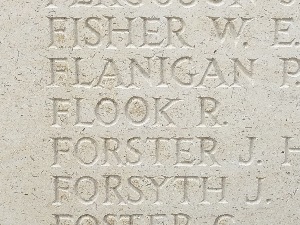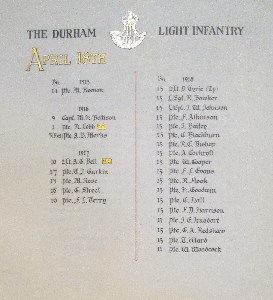
Tyne Cot Memorial

D.L.I. Memorial Book
Pauline Priano has submitted the following:-
Robert Flook was born March 21st 1894, he was the son of William Flook a Welsh miner from Abergavenny, Monmouthshire (1844-1908) and Mary from Bishopwearmouth (1857-1900). Robert’s father came to the north east alone when he was in his twenties and lived firstly in Ryhope working at the colliery and boarded with the Stonach family before he married Mary with whom he had 10 children, 4 boys and 6 girls. After the death of his parents Robert and his youngest sister Ann went to live with their older sister Eliza and her husband George Jacques at 80, Charlotte Street, Wallsend on Tyne, who became their adoptive parents. Robert was employed as a miner.
Britain declared a state of war existed with Germany, August 4th 1914. In answer to Kitchener’s call to arms and the order that all regiments raise new battalions, men from all walks of life volunteered to serve their Country. At the time Robert Flook was employed as a coal miner, living at 41, Raby Terrace, Chilton, Ferryhill. May 8th 1915 he enlisted at Bishop Auckland and was embodied into the 2/6th Battalion Durham Light Infantry that same day as Private 3732. The 6th Battalion D.L.I. was part of the Territorial Force intended for service in the United Kingdom. Overseas service could not be imposed on men in its ranks unless they signed an agreement with the Army to do so. Private Flook signed an agreement to serve in any place outside the United Kingdom in the event of a national emergency, at Morpeth, May 15th 1915.
Private Flook’s record of service is problematic. He was frequently in trouble whilst in Felling and Doncaster and punished with a fine and confinement to barracks. Based at Scotton he was made aware of his imminent departure to the Western Front and overstayed his embarkation leave from 11 p.m. until 10 a.m. August 2nd 1916 and was again confined to barracks for 21 days and lost 4 days pay.
His confinement was reduced as he departed from Folkestone, August 13th 1916 disembarking at Boulogne that same day making his way to the 35th Infantry Base Depot at Etaples where he was posted to the 14th Battalion D.L.I., August 24th 1916, joining them in the field on the Somme, August 26th.
The 14th Battalion attached to the 6th Division soon after his arrival moved to join the fighting during the Battle of Morval, September 25th-28th and Le Transloy, October 1st-18th 1916 but did not take part in any other major encounters, spending the winter in the trenches until the spring of 1917. The Arras Offensive commenced April 9th 1917 and raged until May 16th. The 14th Battalion was involved in the Lens coalfield but having captured Nash Alley was withdrawn having sustained heavy casualties.
Private Flook during this period was again in trouble. April 24th 1917 without permission or being ordered to do so he left the dump in the village of Loos and wandered off. It is plausible that he was suffering from some kind of mental strain or battle fatigue although there is no mention of this in his military record.
On the occasion in question he was more severely punished with 28 days Field Punishment No.1. This punishment was more commonly known by the troops as, “crucifixion,’ it entailed labour duties and being tied to a wagon wheel or a post in shackles for 2 hours a day. During part of the labour duties undertaken by Private Flook he was found to be drunk in charge of a horse and cart and the Field Punishment No.1 was extended. Labour duties were not necessarily undertaken away from the front line and in the case of Private Flook he was gassed, May 27th 1917. Evacuated back through the lines by the 18th Field Ambulance he was finally admitted to the 35th General Hospital at Calais.
June 6th 1917 Private Robert Flook was repatriated to England aboard the HM Hospital Ship Stad Antwerpen. Newly built in 1913 she was a Belgian vessel which prior to WW1 ran a ferry service from Ostend to Dover and Folkestone. In 1914 she became a hospital ship and subsequently on loan to Britain the vessel evacuated troops from Calais, Boulogne and Dieppe to the United Kingdom. Sufficiently recovered but not considered fully fit, Private Robert Flook was posted to the 4th Durham Light Infantry at Seaham Harbour, July 23rd 1917. The 4th Battalion was part of the coastal defences during WW1 but also trained volunteers and retrained the wounded and sick for service overseas.
Whilst in the vicinity of Chilton Colliery, October 19th 1917 Private Flook stole a bicycle, the act was witness by two people and later involved the intervention of P.C. John Brown. Robert was held under arrest at Seaham Harbour by the civil authorities until November 7th 1917, awaiting trial, then handed over to the military to be court martialled. He was accused as follows; “1) When under orders on active service, deserting His Majesty’s Services. 2) Losing in neglect articles of kit etc.” Private Flook was found guilty on all charges, bound over for 12 months and fined £5.
Private Robert Flook was released from detention on the understanding he return to his regiment on active service with the first available draft. All Territorials were renumbered in 1917 and as Private 45462 Robert Flook he departed to France, December 20th 1917 where he was posted to the 18th Battalion Durham Light Infantry, December 21st at Etaples and 4 days later reposted to the 15th Battalion attached to the 64th Brigade, 21st Division. He joined his regiment, January 4th 1918, on the Ypres salient in Belgium where the 3rd Battle of Ypres had concluded November 10th 1917 and the troops remained in the trenches facing the harsh conditions of winter.
Private 45462 Robert Flook Durham Light Infantry was killed in action on the Ypres salient, April 18th 1918 where his battalion was entrenched at Somers Farm/Estimanet Corner. His sacrifice is recorded as one of 33,783 names of British servicemen inscribed on the Tyne Cot Memorial to the Missing which forms part of the perimeter wall at Tyne Cot Cemetery, Zonnebeke, near Ypres in Belgium, commemorating servicemen who died as of August 15th 1917 on the Ypres salient who have no known grave. Private Robert Flook was 24 years of age and single.
As per his will, which was forwarded to the War Office, May 14th 1918, all monies owed to the late Private Flook from the Army were assigned to his legatee, Miss Pauline E. Thorne, She also received his awards of the British War Medal and Victory Medal but her claim to the Memorial Plaque was refused, November 20th 1924. As was the norm, the plaque was distributed to Robert’s next of kin, in this instance, his eldest brother Joseph Flook.
Pauline E. Thorne was married in Gateshead, historically in County Durham, during the 4th quarter (Oct/Nov/Dec) 1918, to Thomas Irish. Having married so soon after Robert’s demise she may only have been a friend rather than a sweetheart or fiancé.
In God’s safe keeping. Rest In Peace.
Robert Flook is remembered at Chilton on C107.01, C107.04 and C107.12 and at Sherburn on S121.08

